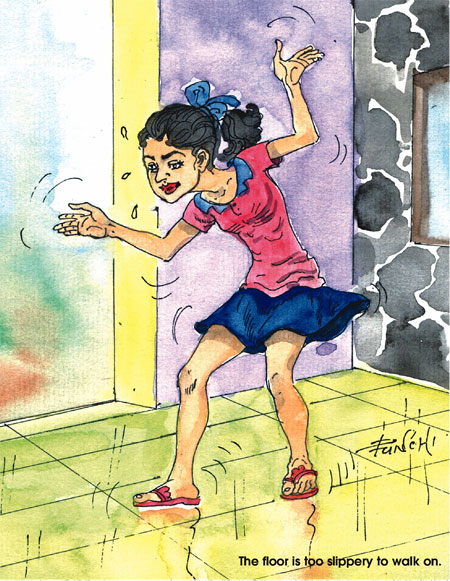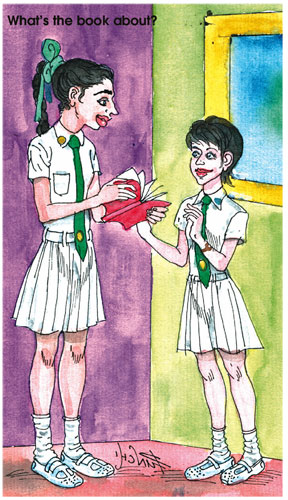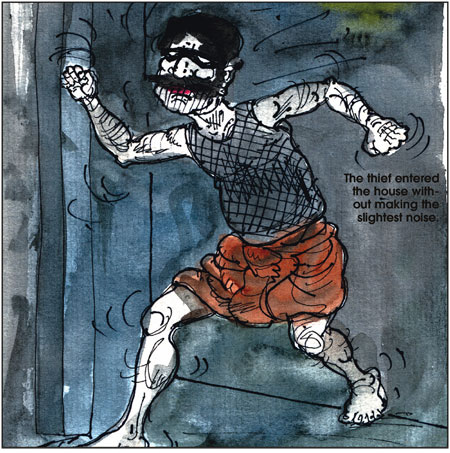|

by R. S. Karunaratne
Prepositions in questions
 We often put a preposition at the end of a question, especially in
spoken English. We often put a preposition at the end of a question, especially in
spoken English.
Who did you go with?
(This is more natural than “With whom did you go?)
Who is that letter for?
What are you looking at?
What are you talking about?
Where do you come from?
Where are you from?
Where shall I send him to?
What are you looking for?
Who did Mary send the letter to?
Where is your husband from?
What’s the book about?
Who are you in love with?
What are you waiting for?
Who are you writing to?
Sometimes we drop the preposition in answer to a question.
A: Where does he live?
B: Don’t know, Kandy I think?
(“in Kandy” is understood)
A: Where is the post office?
B: Top of Hill Street, on your left.
(“at the top” is understood)
A: What time are we meeting?
B: Nine o’clock.
(“At what time ... “At nine o’clock ... are understood)
With expressions of place and time, the preposition can be dropped.
Poor people have nowhere to go.
(... nowhere to go to” is understood)
You’ve got exactly 15 minutes to finish the job.
(”... 15 minutes in which...” is understood)
Preposition stranding
A preposition is stranded when it is separated from its complement.
What was he referring to?
We can, in a formal way, express the same idea:
To what was he referring?
 Traditional grammarians advise us never to end a sentence with a
preposition. However, in natural English we often end a sentence with a
preposition. Traditional grammarians advise us never to end a sentence with a
preposition. However, in natural English we often end a sentence with a
preposition.
Who did you talk to?
She needs someone to go with.
He is the only man I have some confidence in.
What are you so afraid of?
Your request is being looked into.
The floor is too slippery to walk on.
He is the man she has been talking with.
Match words and meanings
Here’s a novel method of enriching your vocabulary. Match the words
in column ‘A’ with their meanings in column ‘B’ and check your answers
with the key. The first has been done for you.
[Column A]
Y 1. compatriot
... 2. compel
... 3. compendium
... 4. compensate
... 5. compere
... 6. compete
... 7. competence
... 8. competitor
... 9. complacency
... 10. complain
... 11. complaisance
... 12. complement
... 13. complete
... 14. complex
... 15. complexion
... 16. compliant
... 17. complicate
... 18. complicity
... 19. compliment
... 20. comply
... 21. component
... 22. comport
... 23. compose
... 24. composed
... 25. composer
[Column B]
A. one who writes music
B. in control of your emotions
C. to produce music or poetry
D. to behave
E. a part which combines with other parts
F. to act according to an order
G. a remark of admiration
H. involvement in a crime
I. to make something more difficult to deal with
J. willing to do what others tell you
K. the natural appearance of the skin
L. involving a lot of different parts
M. to make something whole or perfect
N. to make something else seem better
O. a willingness to please others
P. to say that something is wrong
Q. a feeling of calm satisfaction
R. one who competes against another
S. the ability to do something well
T. to take part in a competition
U. one who introduces performers in a stage show
V. to pay money for something lost
W. a short but complete account of a subject
X. to force somebody to do something
Y. one who comes from the same country
Key:
2. X 3. W 4. V 5. U 6. T 7. S 8. R 9. Q 10. P 11. O 12. N 13. M 14. L
15. K 16. J 17. I 18. H 19. G 20. F 21. E 22. D 23. C 24. B 25. A
Starters:
Preposition and linking word + ‘... ing’ form
 We use an ‘... ing’ form after some prepositions. We use an ‘... ing’ form after some prepositions.
I usually read a book instead of watching television.
Since discovering I couldn't get a better job, I accepted the offer to
work as a clerk.
As a result of losing my National Identity Card, I had to make a
complaint to the police.
She works as a cook as well as serving as a janitor.
He got skin cancer from being in the sun too long.
Some businessmen are in favour of cutting down valuable trees.
I decided to work in spite of not feeling well.
The thief entered the house without making the slightest noise.
My parents are against borrowing money from anyone.
Lal is suffering from lung cancer as a result of smoking heavily.
Associating with criminals is below your dignity as well as degrading.
Besides amassing wealth he earned money in dubious ways.
The robber got into the building by breaking a window.
Do you play any other sports besides playing football?
He went in by pushing the front door.
He managed to eat a big lunch despite having eaten an enormous
breakfast.
I was prevented from taking my own luggage.
How about giving us some help?
He smiled without losing his temper.
Linking word + ‘...ing’ form
She always has a shower after playing tennis.
Amanda finished writing the essay before going to bed.
He has been unemployed since leaving the university.
Please lock the door when leaving your room.
He shook hands with me while sitting in his chair.
Activity 1
Put in ‘before’ or ‘after’ and the ‘...ing’ form of the verb given in
brackets. Check your answers with the key.
1. Replace the receiver properly ............... the call. (take)
.....................................................
2. Read the question paper carefully ................. . (answer)
.....................................................
3. Never have a bath ................... a meal. (have)
.....................................................
4. Always return the books to the library .................. them.
(read)
.....................................................
5. Switch off the electricity ................ a bulb. (change)
.....................................................
Activity 2
Combine the two sentences using the words given in brackets and check
your answers with the key.
1. He saw a gypsy. He was walking around the city. (while)
...................................................
2. Swapna thought carefully. She decided to buy the sari. (before)
...................................................
3. Ram bought the bicycle. He had very little money. (despite)
...................................................
4. He became popular. He acted his roles well. (by)
...................................................
5. Shyma was happy. She was running her own saloon. (when)
...................................................
Key:
Activity 1
1. Replace the receiver properly after taking the call.
2. Read the question paper carefully before answering.
3. Never have a bath after having a meal.
4. Always return the books to the library after reading them.
5. Switch off the electricity before changing a bulb.
Activity 2
1. He saw a gypsy while walking around the city.
2. Swapna thought carefully before deciding to buy the sari.
3. Ram bought the bicycle despite having very little money.
4. He became popular by acting his roles well.
5. Shyma was happy when she was running her own saloon.
Quiz on idioms
An idiom is a special kind of phrase. It is a group of words which
have a different meaning when used together from the one it would have
if the meaning of each word were taken individually. Tick the meaning
you think is correct and check your answers with the key.
1. If an event or piece of news was like a bolt from the blue ...
(a) it was completely unexpected
(b) it was expected
(c) it was not important
2. If a vehicle or horse goes like a bomb ...
(a) it can move rhythmically
(b) it can move very slowly
(c) it can move very fast
3. If you drop a bombshell ...
(a) you give a piece of good news
(b) you suddenly give a piece of bad news
(c) you drop a bomb suddenly
4. A bone of contention ...
(a) is an issue nobody is interested in
(b) is an issue that has no importance
(c) is an issue people have been arguing about for a long time
5. If you have a bone to pick with somebody ...
(a) you are annoyed with them about something
(b) you are pleased with them about something
(c) you have an important issue to talk about
6. If you feel something in your bones ...
(a) you feel strongly that you are innocent
(b) you feel strongly that you are strong
(c) you feel very strongly that you are right
7. If you make no bones about something ...
(a) you do not hesitate to express your thoughts
(b) you do not hesitate to object
(c) you do not hesitate to reject something
8. If somebody is brought to book ...
(a) they are praised for something they have done
(b) they are punished for something they have done
(c) they are promoted for something they have done
9. If you do something by the book ...
(a) you do not do it
(b) you do it correctly
(c) you do it incorrectly
10. I something is a closed book to you ...
(a) you understand very little about them
(b) you understand a lot about them
(c) you express a desire to know them
Key:
1. (a) 2. (c) 3. (b) 4. (c) 5. (a) 6. (c) 7. (a) 8. (b) 9. (b) 10.
(a) |

